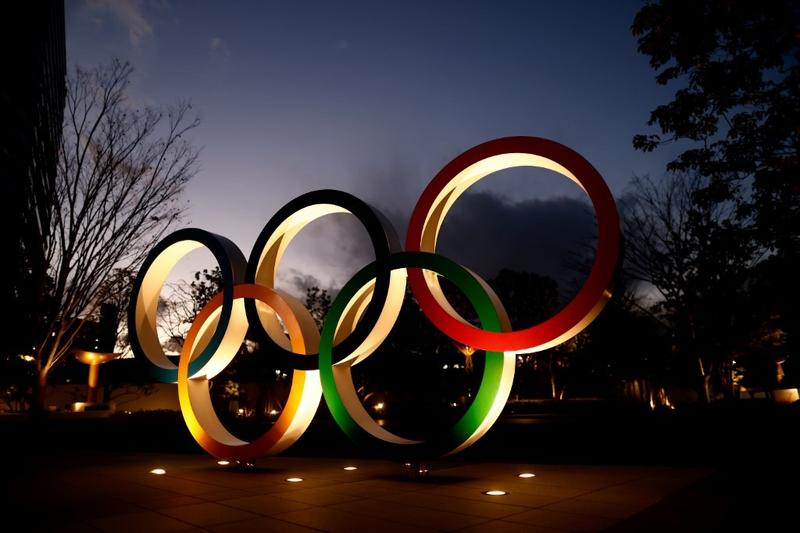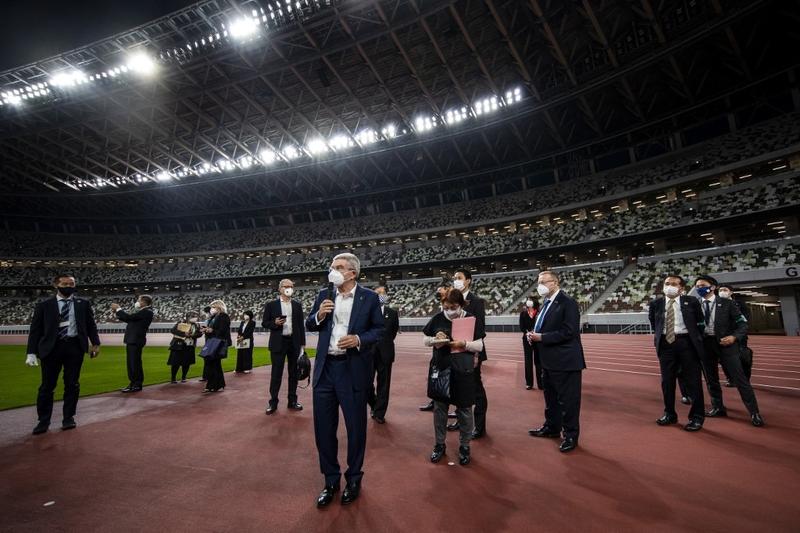 Olympic Rings are seen near the National Stadium, the main venue for the Tokyo 2020 Olympic and Paralympic Games, in Tokyo on Jan 8, 2021. (BEHROUZ MEHRI / AFP)
Olympic Rings are seen near the National Stadium, the main venue for the Tokyo 2020 Olympic and Paralympic Games, in Tokyo on Jan 8, 2021. (BEHROUZ MEHRI / AFP)
TOKYO - Rumors ran wild last weekend in China that the Tokyo Olympics would be canceled and moved to 2032, immediately causing a stir among athletes who had planned to compete at the showpiece event in under 200 days.
The state of emergency in Tokyo will be lifted on February 7 and organizers are in a race against time to control the pandemic before Olympic test events resume on March 4 to 7
It emerged that the report originally came from a Japanese gossip magazine, which also claimed that the cancelation of the Tokyo Games could be announced as early as January 18.
The International Olympic Committee (IOC) has moved swiftly to deny such accusations and reaffirm its commitment to hosting the already-delayed Tokyo Olympics this summer.
"We continue to be fully concentrated and committed to the safe and successful delivery of the Olympic and Paralympic Games Tokyo 2020 this summer," an IOC spokesperson told Xinhua.
ALSO READ: IOC reaffirms commitment to host Tokyo 2020 amid speculations
Tokyo 2020 organizing committee CEO Toshiro Muto put it more simply, dismissing all such reports concerning the cancelation of the Games as "fake news".
But with the COVID-19 pandemic worsening in Tokyo and surrounding areas with Olympic venues, and Japan's capital currently in its second state of emergency, it is becoming increasingly difficult to convince doubters that the Games can take place on their rescheduled dates of July 23 to August 8.
Dick Pound, an IOC member since 1978, said that he "can't be certain because the ongoing elephant in the room would be the surges in the virus."
Ironically, Pound was also the first IOC member to raise doubts as early as February last year that the Tokyo Olympics would not take place as planned in 2020.
Four-time Olympic champion Matthew Pinsent of Britain also called for the Games to be canceled and for Tokyo to host the event in 2024 instead, with Paris and Los Angeles then hosting the Games in 2028 and 2032.
The Japanese side has always insisted that the Tokyo Games would be held as scheduled.
Prime Minister Yoshihide Suga, who claimed when taking office last September that staging the Olympics is his government's top priority, reiterated this stance three times in seven days from January 1, 2021.
Addressing approximately 3,500 committee staff members in an online event on Wednesday, Tokyo 2020 president Yoshiro Mori reaffirmed his commitment in more poetic language.
"We will go through this dark tunnel together with you. Spring will eventually come. The morning will always come after a long night," the former Japanese Prime Minister said.
But the Japanese government and Olympic organizers are continuing to grapple with rising COVID-19 cases nationwide. Suga is set to expand a state of emergency on Friday to include Osaka, Kyoto and Hyogo prefectures, as the virus is also surging in western Japan.
Aichi and Gifu prefectures are also likely to be added to the expanded state of emergency, following requests from their governors.
 International Olympic Committee (IOC) president Thomas Bach (center) wears a face mask as he visits the National Stadium, the main venue for the 2020 Olympic and Paralympic Games postponed until July 2021 due to the COVID-19 coronavirus pandemic, in Tokyo on Nov 17, 2020. (BEHROUZ MEHRI / POOL / AFP)
International Olympic Committee (IOC) president Thomas Bach (center) wears a face mask as he visits the National Stadium, the main venue for the 2020 Olympic and Paralympic Games postponed until July 2021 due to the COVID-19 coronavirus pandemic, in Tokyo on Nov 17, 2020. (BEHROUZ MEHRI / POOL / AFP)
However, five days after entering the state of emergency, confirmed cases reported in the Tokyo metropolitan area had reduced to 970 on Tuesday, marking the first time since January 4 that the daily infection number in the capital of 14 million had dropped below the 1,000-mark.
The state of emergency in Tokyo will be lifted on February 7 and organizers are in a race against time to control the pandemic before Olympic test events resume on March 4 to 7, when the FINA artistic swimming Olympic qualification tournament will be held at the Tokyo Aquatics Centre.
Overseas athletes had been expected to attend the test events when a third wave of the pandemic hit Japan last autumn. And a four-nation gymnastics tournament featuring China, Russia, United States and Japan proved successful by accommodating athletes and officials in a COVID-resistant "bubble".
IOC president Thomas Bach was optimistic about an Olympic Games with a "reasonable" number of overseas spectators during his visit in mid-November.
But the situation has since changed and the IOC and Tokyo 2020 may have to consider hosting the Games behind closed doors or with Japanese fans only.
According to Kyodo news agency, Tokyo 2020 head Mori admitted on Wednesday, "I think we will have to make a very difficult decision from February to March." He also stressed that putting off the Games again is "absolutely impossible".
With organizers having been left with little choice, now may be the time to listen carefully to medical experts.
Haruo Ozaki, head of the Tokyo Medical Association, told Japan's Daily Sports newspaper that the country should plan for an Olympics with no spectators, otherwise it could risk being canceled.
Yoshiharu Matsuura, a professor from the Research Foundation for Microbial Disease of Osaka University, said that the only way for the Olympics to take place is with the rollout of a substantial vaccination program. But reports revealed that some vaccines are unlikely to win approval in Japan until May due to requirements for local clinical trials.
READ MORE: Survey: 80% want Tokyo Games cancelled or delayed
And the biggest problem for Japan to consider is the pandemic situation in other countries and regions, especially the United States, which has won the most gold medals in Olympic history.
On Tuesday, the US recorded more than 235,000 new cases and a record high of 4,470 deaths. Meanwhile, the U.K. recorded another 45,533 cases and 1,243 deaths on the same day.
With over 80 percent of Japanese people wanting the Olympics to be canceled or postponed again, according to the latest Kyodo poll, it remains to be seen whether the country is willing to welcome athletes from nations that are struggling to control the virus.


